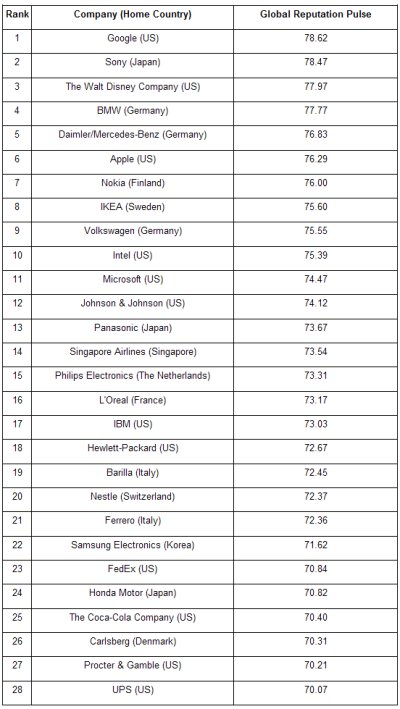The World's Most Reputable Companies

"Technology has a powerful grip on the global rankings," says Dr. Charles Fombrun, Chairman of Reputation Institute. "Companies like Google, Sony, Apple, Nokia, Intel, and Microsoft have earned our trust and respect because they are all-pervasive solution-providers that affect our daily lives. Disney's global mind-share as an entertainment provider is remarkable, as is the admiration with which consumers hold auto-makers BMW and Daimler/Mercedes-Benz. They are power-houses of reputation-building around the world."
Geographical Highlights
Reputation Institute examined how these companies were perceived across five regions: Asia, Central Europe, Central & South America, North America, and Northern Europe.
Top rated Sony and Google were consistently strong around the world, with Sony scoring among the top five in all regions and Google in four of the five regions. Google did not make it into Asia's top five.
The rankings within regions are:
•Asia: 1) The Walt Disney Company, 2) Daimler/Mercedes Benz, 3) BMW, 4) Sony, and 5) Singapore Airlines.
•Central Europe: 1) Sony, 2) BMW, 3) Google, 4) Volkswagen, and 5) Daimler/Mercedes Benz.
•Central & South America: 1) Nestle, 2) Sony, 3) Google, 4) BMW, and 5) Johnson & Johnson.
•North America: 1) Johnson & Johnson, 2) Google, 3) Nestle, 4) The Walt Disney Company, and 5) Sony.
•Northern Europe: 1) Google, 2) IKEA, 3) Sony, 4) The Walt Disney Company, and 5) Singapore Airlines.
Reputation, Can You Take it With You?
Most companies can expect to be more liked, trusted, admired and respected in their home countries than around the world. Of the 54 companies measured in the study, only five had a better reputation globally than they enjoy in their home markets: Apple, Ford, Google, Nestle, and Sony.
According to Kasper Nielsen, Managing Partner of Reputation Institute, "companies often ask us whether we think they can export their home-grown reputations to other countries. Based on this study, the answer is a qualified yes. Some have done it, but most have not fared as well abroad as they could. It clearly suggests that the same communication strategies used in one country will not always succeed in another. In our reputation analyses, we find that what matters most to consumers can vary widely from one country or region to another. But universally it pays off to build reputation. If you improve reputation by 5 points you improve recommendations by 6%. So companies must identify what people are expecting from them so they can identify areas to focus on in order to earn the support of consumers."
How to Tell Your Corporate Story
Consumers want to know what a company is doing beyond its product and services. Excellent reputations are built across seven key dimensions: Products/Services, Innovation, Governance, Workplace, Citizenship, Leadership and Performance. Statistical analysis shows that each dimension accounts for over 12 percent of the variation in reputation. Top scorers Google and Sony performed well across dimensions, with Google rated among the top five on all seven dimensions and Sony among the top ten. The results confirm that a balanced reputation platform is what earns trust, esteem, admiration, and good feeling from consumers.
Drivers of reputation vary by industry and country. In 2010, across the final 54 companies measured by Reputation Institute, the most influential factors with consumers are Products/Services, Innovation, and Governance. As Nicolas Trad, Managing Partner, Reputation Institute, puts it "…the key insight from this analysis is that people care more than ever about the companies behind the products and services they use. Companies can create deeper connections with consumers than products alone can achieve, and they do this by speaking out about who they are as companies and engaging on what matters to them. Getting the word out helps drive business results."





